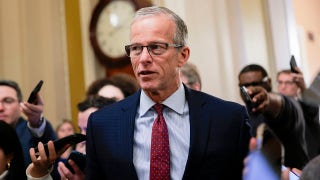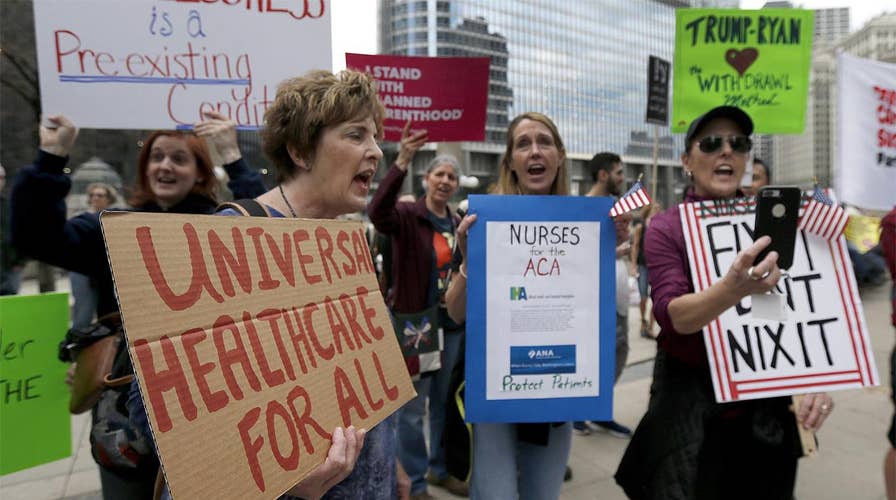Blue states consider single-player health care system
William LaJeunesse reports from Los Angeles
LOS ANGELES – With ObamaCare broken and the GOP effort to replace it uncertain, California and a handful of other liberal states are proposing to adopt a European-style, single-payer health care system where residents pay the state and the state provides care – regardless of income, occupation, or health status.
"If you look at the financing of a single-payer system, what you'll find is it saves money if it's done right," says supporter Jamie Court of Consumer Watchdog. "That's why every other country in the world pays two-thirds less. It gets rid of the insurance companies.”
Lawmakers in New York, New Jersey, Rhode Island and Massachusetts proposed single-payer bills this year. Last week, a bill passed the California Senate that would make every resident, legal or not, eligible for coverage – no premium, no copayment, no deductible.
IS HEALTH CARE A RIGHT OR A GOOD?
"The idea, the lure of that simplicity, of the government running everything is going to be there," said health care expert Avik Roy. "And I think a lot of conservatives are worried if Republicans fail to replace ObamaCare the calls for single payer are going to grow."
That's already happening.
According to a January poll by Pew Research, 40 percent of Democratic voters favor a single-payer system. And a majority, about 60 percent of Americans, said the government has a responsibility to ensure every resident has healthcare.
In Congress, 112 of 193 House Democrats have co-sponsored a single-payer bill paid for by higher taxes on the wealthy.
"A number of states have tried to set up single payer – and they all abandon the effort because the taxes are too high and California is going to find out the same thing," said Roy.
The California bill still has no financial mechanism to pay for it. But the estimated price tag is $400 billion, more than the $290 billion state budget and considerably more than the $367 billion in state, federal and private money currently used to pay for healthcare in the Golden State.
NEWT GINGRICH: HEALTH CARE IS PERSONAL. THAT'S WHY CONGRESS HAS TO GET IT RIGHT
"So this is really a laboratory vote no question," Court said. "But it is also an important discussion to have and it's an important chemistry to work out because health insurance companies are ripping us off – they're denying us coverage – they're denying our claims. And the drug companies are doing the same."
Under single-payer, insurance companies like Kaiser, Aetna, Blue Cross and UnitedHealth Group will all be out of business. The state would instead contract directly with providers for services.
While cutting out the middle man may sound good, critics say to control costs the government simply denies care, meaning consumers will not get all the drugs or care they need or want, and doctors and hospitals will have no choice but to accept whatever reimbursement rate the government mandates.
Medical salaries would inevitably go down, as illustrated in other countries embracing nationalized medicine.
KRAUTHAMMER: 'WE WILL BE IN A SINGLE-PAYER SYSTEM' WITHIN 7 YEARS
"So the quality and competition goes away in single payer in a way the private system has in a robust way," says Roy.
The California bill must still pass the Assembly and needs a signature from Gov. Jerry Brown, who reportedly supports single payer in concept, but is skeptical since the bill is silent on how it’s paid for. Pete Peterson, dean of the Pepperdine School of Public Policy in Malibu, says for the plan to get even this far illustrates how far left the state Democratic Party has swung.
"I think this recent vote in the Legislature around single payer is bowing towards the Bernie Sanders wing of the party," says Peterson. "The challenge for someone like Gov. Brown is how he holds his party together, one that is really being pulled in two different directions – one being the moderate, Clinton or Obama wing vs. the Bernie wing, which is increasing in power."













































